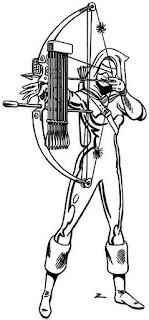The Moment in a Campaign
If you ask me why the Claremont era of the X-Men was so damn good, I would have to say that it wasn't the whole "Dark Phoenix" saga, or even "Days of Future Past" (although that was very good), it is the in-between moments in the series. I'm talking about the moments between the fights where you would see the X-Men hanging around in their 70's turtlenecks and mod dresses shooting the breeze about being an unloved mutant superhero or who they have a crush on or whatever. It was a moment when they were people and not just powers, and you the reader had the chance to actually experience the fullness of their lives.
The X-Men have since lost this. Just look at any comic book and see how infrequently the X-Men are out of costume. Our appetites now reflect a stronger desire to more action, more splash pages, and bigger conflicts. And in my opinion, the comics books are less interesting as a result. You can see this in other genres, that question of pacing and taking the odd break to allow the viewer/reader/consumer to take a breath and get to know people.
Now, this isn't a comic book blog (because God knows there are plenty of those), it's an RPG blog. So what does this have to do with roleplaying games? Because a while back my friend Adam made a comment about moments like this. For him, it was the moment where the players are just hanging out in the repair bay of the space station waiting for work to get done, or lounging around the base discussing whether Rainbow Archer was a superheroine or villain. (The answer is villain, by the way. She's in "Classic Villains" after all, and that book is chock full of pro-establishment politics.)
The way I see it, getting any RPG campaign to that moment means that finally the players have stopped looking at the campaign as quests to be solved or villains to be beat down but are now actually living in the world. They are thinking about how their PC's act outside of conflict. But most importantly, they are investing in a profound way in the shared imaginary reality of the world at a level that transcends die rolling and the like.
I feel like this should be some of sort of "GM Achievement" like when you accomplish something in a video game. If you GM a campaign in such a manner than eventually this happens, it should be celebrated.
The X-Men have since lost this. Just look at any comic book and see how infrequently the X-Men are out of costume. Our appetites now reflect a stronger desire to more action, more splash pages, and bigger conflicts. And in my opinion, the comics books are less interesting as a result. You can see this in other genres, that question of pacing and taking the odd break to allow the viewer/reader/consumer to take a breath and get to know people.
Now, this isn't a comic book blog (because God knows there are plenty of those), it's an RPG blog. So what does this have to do with roleplaying games? Because a while back my friend Adam made a comment about moments like this. For him, it was the moment where the players are just hanging out in the repair bay of the space station waiting for work to get done, or lounging around the base discussing whether Rainbow Archer was a superheroine or villain. (The answer is villain, by the way. She's in "Classic Villains" after all, and that book is chock full of pro-establishment politics.)
 |
| And what's up with those boot cuffs? |
The way I see it, getting any RPG campaign to that moment means that finally the players have stopped looking at the campaign as quests to be solved or villains to be beat down but are now actually living in the world. They are thinking about how their PC's act outside of conflict. But most importantly, they are investing in a profound way in the shared imaginary reality of the world at a level that transcends die rolling and the like.
I feel like this should be some of sort of "GM Achievement" like when you accomplish something in a video game. If you GM a campaign in such a manner than eventually this happens, it should be celebrated.


You make a great point and I agree - it's a sign that the characters are more than just numbers/powers/gear and it is a milestone for any campaign.
ReplyDelete(It's also an interesting thing to track in superhero movies as well)
A similar and possibly related sign, maybe a step on the way to this one: When they start to care about what their characters are wearing - the way it looks, not the bonus it provides or how much damage it stops. Just how it looks on the character in their mind.